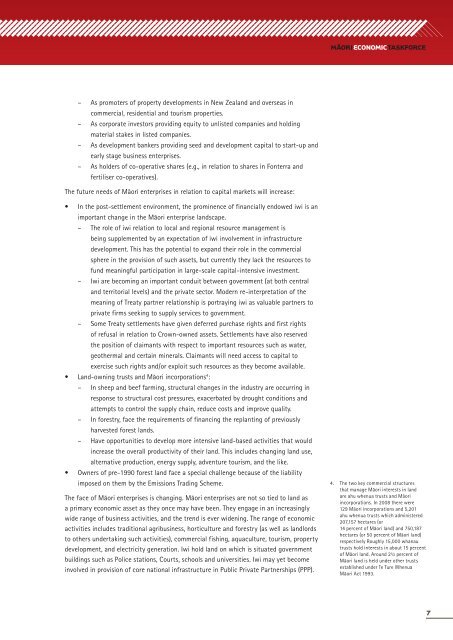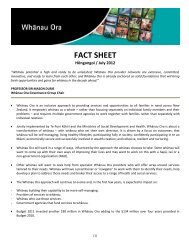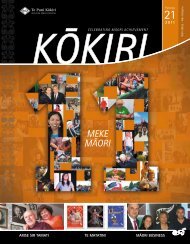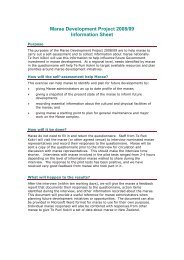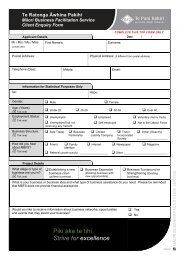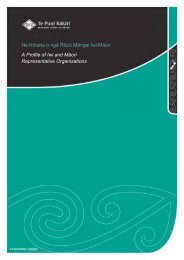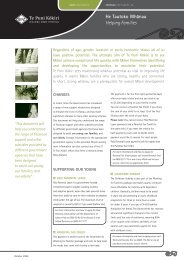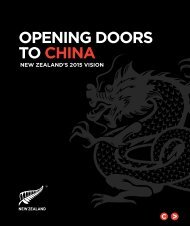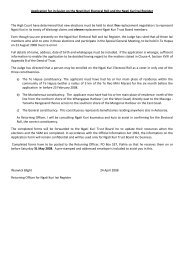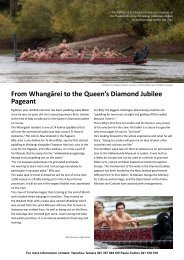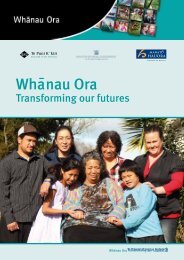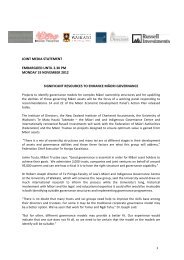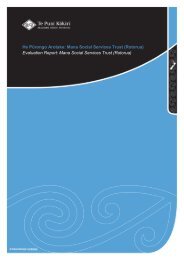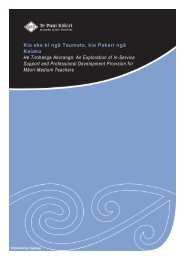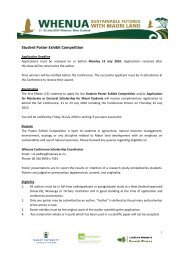MÄÂori Enterprise and the New Zealand Capital ... - Te Puni Kokiri
MÄÂori Enterprise and the New Zealand Capital ... - Te Puni Kokiri
MÄÂori Enterprise and the New Zealand Capital ... - Te Puni Kokiri
You also want an ePaper? Increase the reach of your titles
YUMPU automatically turns print PDFs into web optimized ePapers that Google loves.
– As promoters of property developments in <strong>New</strong> Zeal<strong>and</strong> <strong>and</strong> overseas in<br />
commercial, residential <strong>and</strong> tourism properties.<br />
– As corporate investors providing equity to unlisted companies <strong>and</strong> holding<br />
material stakes in listed companies.<br />
– As development bankers providing seed <strong>and</strong> development capital to start-up <strong>and</strong><br />
early stage business enterprises.<br />
– As holders of co-operative shares (e.g., in relation to shares in Fonterra <strong>and</strong><br />
fertiliser co-operatives).<br />
The future needs of Mäori enterprises in relation to capital markets will increase:<br />
• In <strong>the</strong> post-settlement environment, <strong>the</strong> prominence of financially endowed iwi is an<br />
important change in <strong>the</strong> Mäori enterprise l<strong>and</strong>scape.<br />
– The role of iwi relation to local <strong>and</strong> regional resource management is<br />
being supplemented by an expectation of iwi involvement in infrastructure<br />
development. This has <strong>the</strong> potential to exp<strong>and</strong> <strong>the</strong>ir role in <strong>the</strong> commercial<br />
sphere in <strong>the</strong> provision of such assets, but currently <strong>the</strong>y lack <strong>the</strong> resources to<br />
fund meaningful participation in large-scale capital-intensive investment.<br />
– Iwi are becoming an important conduit between government (at both central<br />
<strong>and</strong> territorial levels) <strong>and</strong> <strong>the</strong> private sector. Modern re-interpretation of <strong>the</strong><br />
meaning of Treaty partner relationship is portraying iwi as valuable partners to<br />
private firms seeking to supply services to government.<br />
– Some Treaty settlements have given deferred purchase rights <strong>and</strong> first rights<br />
of refusal in relation to Crown-owned assets. Settlements have also reserved<br />
<strong>the</strong> position of claimants with respect to important resources such as water,<br />
geo<strong>the</strong>rmal <strong>and</strong> certain minerals. Claimants will need access to capital to<br />
exercise such rights <strong>and</strong>/or exploit such resources as <strong>the</strong>y become available.<br />
• L<strong>and</strong>-owning trusts <strong>and</strong> Mäori incorporations 4 :<br />
– In sheep <strong>and</strong> beef farming, structural changes in <strong>the</strong> industry are occurring in<br />
response to structural cost pressures, exacerbated by drought conditions <strong>and</strong><br />
attempts to control <strong>the</strong> supply chain, reduce costs <strong>and</strong> improve quality.<br />
– In forestry, face <strong>the</strong> requirements of financing <strong>the</strong> replanting of previously<br />
harvested forest l<strong>and</strong>s.<br />
– Have opportunities to develop more intensive l<strong>and</strong>-based activities that would<br />
increase <strong>the</strong> overall productivity of <strong>the</strong>ir l<strong>and</strong>. This includes changing l<strong>and</strong> use,<br />
alternative production, energy supply, adventure tourism, <strong>and</strong> <strong>the</strong> like.<br />
• Owners of pre-1990 forest l<strong>and</strong> face a special challenge because of <strong>the</strong> liability<br />
imposed on <strong>the</strong>m by <strong>the</strong> Emissions Trading Scheme.<br />
The face of Mäori enterprises is changing. Mäori enterprises are not so tied to l<strong>and</strong> as<br />
a primary economic asset as <strong>the</strong>y once may have been. They engage in an increasingly<br />
wide range of business activities, <strong>and</strong> <strong>the</strong> trend is ever widening. The range of economic<br />
activities includes traditional agribusiness, horticulture <strong>and</strong> forestry (as well as l<strong>and</strong>lords<br />
to o<strong>the</strong>rs undertaking such activities), commercial fishing, aquaculture, tourism, property<br />
development, <strong>and</strong> electricity generation. Iwi hold l<strong>and</strong> on which is situated government<br />
buildings such as Police stations, Courts, schools <strong>and</strong> universities. Iwi may yet become<br />
involved in provision of core national infrastructure in Public Private Partnerships (PPP).<br />
4. The two key commercial structures<br />
that manage Mäori interests in l<strong>and</strong><br />
are ahu whenua trusts <strong>and</strong> Mäori<br />
incorporations. In 2008 <strong>the</strong>re were<br />
129 Mäori incorporations <strong>and</strong> 5,201<br />
ahu whenua trusts which administered<br />
207,157 hectares (or<br />
14 percent of Mäori l<strong>and</strong>) <strong>and</strong> 750,187<br />
hectares (or 50 percent of Mäori l<strong>and</strong>)<br />
respectively Roughly 15,000 whanau<br />
trusts hold interests in about 15 percent<br />
of Mäori l<strong>and</strong>. Around 2½ percent of<br />
Mäori l<strong>and</strong> is held under o<strong>the</strong>r trusts<br />
established under <strong>Te</strong> Ture Whenua<br />
Mäori Act 1993.<br />
7


